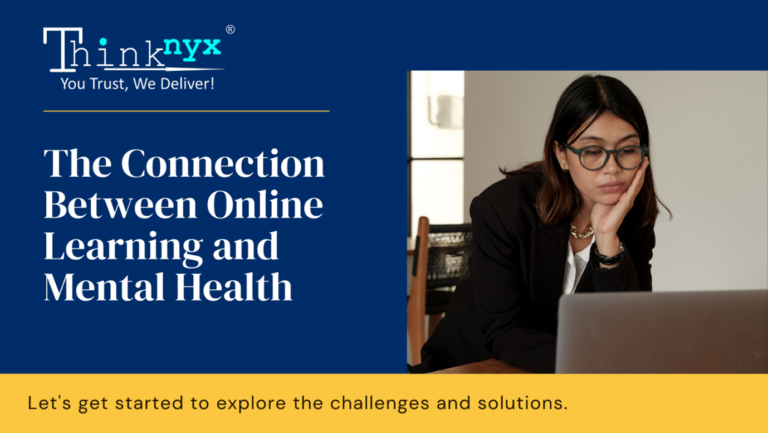
Online Learning and Learner’s Mental Health
In recent times, education has changed a lot because of online learning. Digital platforms have made learning super easy and accessible, completely changing how people learn. Now, anyone can start their learning journey right from home, without the usual limitations. Even though online learning has lots of good things about it, we need to be aware of how it might affect people’s mental health.
Online learning presents an exciting opportunity, allowing individuals to acquire knowledge at their own pace and convenience through digital platforms. It opens up a new dimension of education that is accessible to everyone, enabling learners to customize when and how they engage with the material to fit their schedules. However, while the advantages of this modern learning method are plentiful, it’s crucial to consider its potential impact on our emotions.
Let’s delve into the realm of online learning and explore how it may influence our mental well-being. Recognizing and addressing these effects is essential to maximize the benefits of online education and ensure that everyone embarking on their learning journeys remains content and healthy in the digital realm.
The Upsides of Online Learning:
- Flexibility and Convenience: Online learning provides flexibility in terms of when and where learners can access educational content. This flexibility is especially beneficial for those with busy schedules, allowing them to balance work, family, and education.
- Diverse Learning Resources: Digital platforms offer a wealth of resources, from video lectures and interactive simulations to online forums and discussion boards. This diversity can cater to different learning styles and preferences, fostering a more personalized learning experience.
- Global Learning Communities: Learners have the opportunity to connect with peers and educators from around the world, fostering a global perspective and encouraging cross-cultural understanding.
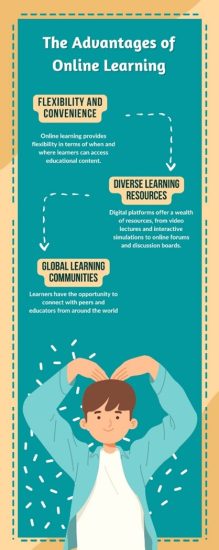
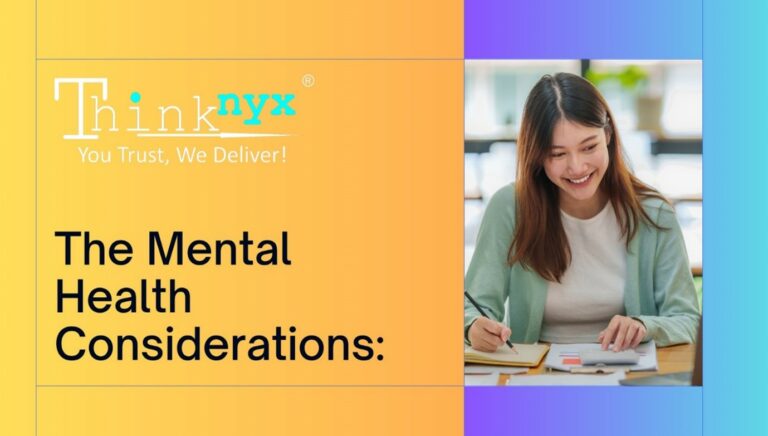
The Mental Health Considerations:
- Isolation and Lack of Social Interaction: One drawback of online learning is the potential for a sense of isolation. The absence of face-to-face interactions with classmates and teachers can lead to feelings of loneliness and disconnection. The virtual nature of communication may contribute to a sense of being alone, impacting the social aspect of the learning experience.
- Digital Fatigue and Screen Time: Extended screen time, a common occurrence in online learning, can lead to feelings of fatigue and exhaustion. Prolonged exposure to screens may result in strained eyes, headaches, and disruptions to your sleep patterns. These physical discomforts can significantly impact your overall well-being and contribute to a less-than-ideal emotional state.
- Self-Discipline and Motivation: Engaging in online learning demands a significant level of self-discipline and motivation. Individuals may encounter challenges in effectively managing their time and sustaining focus, which can give rise to heightened stress and anxiety levels. The need for self-driven initiative in the online learning environment can pose mental hurdles for learners.
Strategies for a Happy Mind: Thriving in Online Learning
A. Establishing Routine
- Importance of a Structured Daily Schedule: A structured daily schedule is the cornerstone of a successful and balanced life. It provides a roadmap for optimizing time, enhancing productivity, and achieving goals. This organized approach not only reduces stress by offering predictability but also cultivates discipline and accountability.
- Balancing Study Time, Breaks, and Physical Activity: Learning is fantastic, but too much of anything isn’t good. Balancing study time with breaks and activities is like having a balanced meal for your brain. Short breaks during study time and a bit of movement keep your mind and body happy. It’s like giving your brain a small vacation to come back even stronger.
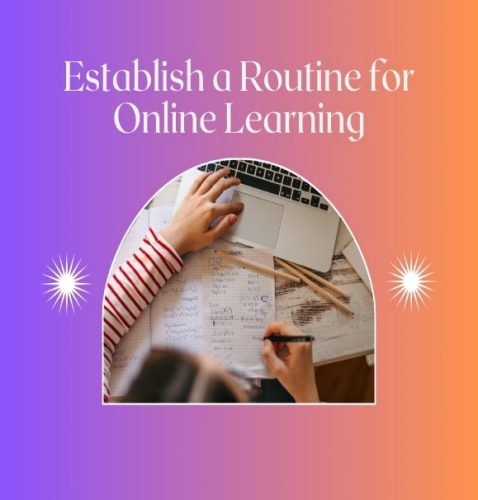
B. Fostering Social Connection

- Virtual Hangouts: Discussion Groups, Forums, and Collaborative Projects: Learning becomes more enjoyable with the company of friends! Virtual discussion groups and forums serve as your online hangout spots, providing opportunities to engage with classmates and teachers about your learning experiences. Collaborative projects are akin to group adventures, fostering teamwork and shared efforts. This collaborative approach transforms learning into a team sport, adding an exciting and communal dimension to the educational journey.
- Building a Supportive Online Community: Envision your online learning space as a quaint village where everyone shares the common goal of learning. Cultivating a supportive community involves being friendly, offering assistance, and exchanging ideas. It’s akin to having a group of buddies who comprehend the challenges you’re facing. A positive online community adds an exciting dimension to your learning journey, creating an environment where shared experiences and mutual support thrive.
C. Mindfulness and Stress Reduction
- Mindfulness Magic in Your Learning Routine: Mindfulness serves as a clandestine magic trick for the mind, involving complete presence in the current moment. Incorporating small mindfulness practices into your learning routine, such as deep breathing exercises or brief meditations, is akin to treating your mind to a mini spa day. These moments of mindfulness offer relaxation and heightened focus, enhancing your overall learning experience.
- Practical Stress-Busters: Navigating the complexities of learning can be challenging, and stress may make an unwelcome appearance. Having practical stress-busters is akin to possessing superhero moves to conquer stress. Whether it’s listening to music, taking a brief walk, or indulging in activities you enjoy, discovering your stress-busting superhero moves can significantly enhance the enjoyment of the learning process.
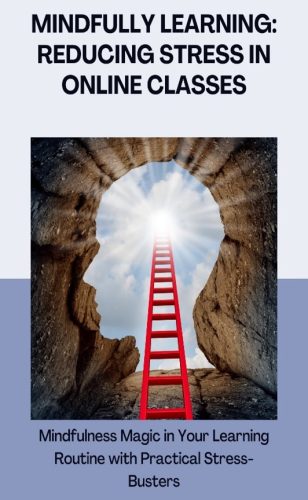
D. Promoting Digital Health
- Screen Time Superpowers: Excessive screen time can lead to tired eyes and a fuzzy mind. Employing screen time superpowers involves taking breaks from your computer or phone, allowing your eyes and brain to engage in a happy dance of refreshment. Setting limits on screen time is a proactive way to stay fresh and maintain focus throughout your learning and work activities.
- Tips for a Healthy Body During Online Learning: Learning isn’t just for your brain; it’s for your entire body. Maintaining a healthy body involves simple tips like stretching, staying hydrated by drinking water, and sitting in a comfortable chair. Taking care of your body is akin to sending it a little love note, ensuring that you remain energized and ready for all the exciting learning adventures that come your way.
Future Trends and Innovations
A. Anticipated Advancements in Technology and Mental Health Support:
The convergence of technology and mental health within the realm of online learning is poised for significant progress. Emotional intelligence functionalities embedded in educational platforms, driven by AI, are expected to offer real-time assessments and responses to students’ emotional states, providing timely assistance. Additionally, chatbots and virtual counsellors, equipped with natural language processing, can serve as immediate resources for students experiencing stress or mental health issues, enhancing accessibility to mental health support. The integration of data analytics for early intervention and monitoring, coupled with the inclusion of mindfulness and wellness features in learning platforms, signifies a holistic approach to addressing the mental well-being of online learners. These advancements aim to establish a supportive, inclusive, and technologically advanced environment for the mental health of students engaged in online education.
B. Evolving Landscape of Online Education:
The evolution of online education is characterized by a move towards personalized learning journeys, utilizing sophisticated algorithms and artificial intelligence to customize content based on individual requirements. This personalization not only improves the learning process but also addresses mental health issues by adapting to diverse learning styles and paces, alleviating stress linked to standardized methods. Furthermore, the incorporation of virtual reality and augmented reality technologies is anticipated to generate immersive and captivating educational encounters, fostering a more stimulating and mentally rewarding atmosphere for online learners.

Conclusion
In conclusion, the transformative shift towards online learning has undeniably revolutionized education, providing unprecedented accessibility and flexibility. While the benefits are abundant, it’s crucial to acknowledge the potential impact on mental health. As we navigate this digital realm of education, recognizing and addressing the challenges is vital to ensuring a positive and healthy learning experience.
The advantages of online learning, such as flexibility, diverse resources, and global communities, are clear. However, we must be mindful of the mental health considerations, including feelings of isolation, digital fatigue, and the need for self-discipline.
To thrive in online learning, establishing a routine, fostering social connections, practicing mindfulness, and promoting digital health are key strategies. Building a supportive online community, engaging in virtual hangouts, and incorporating practical stress-busters contribute to a fulfilling learning journey.
Looking ahead, the future of online education holds promising trends, including advancements in technology and mental health support. The integration of emotional intelligence, virtual counselors, and personalized learning experiences demonstrates a commitment to addressing the holistic well-being of online learners. The evolving landscape of online education, marked by personalization and immersive technologies, aims to create a stimulating and mentally rewarding educational environment for all.